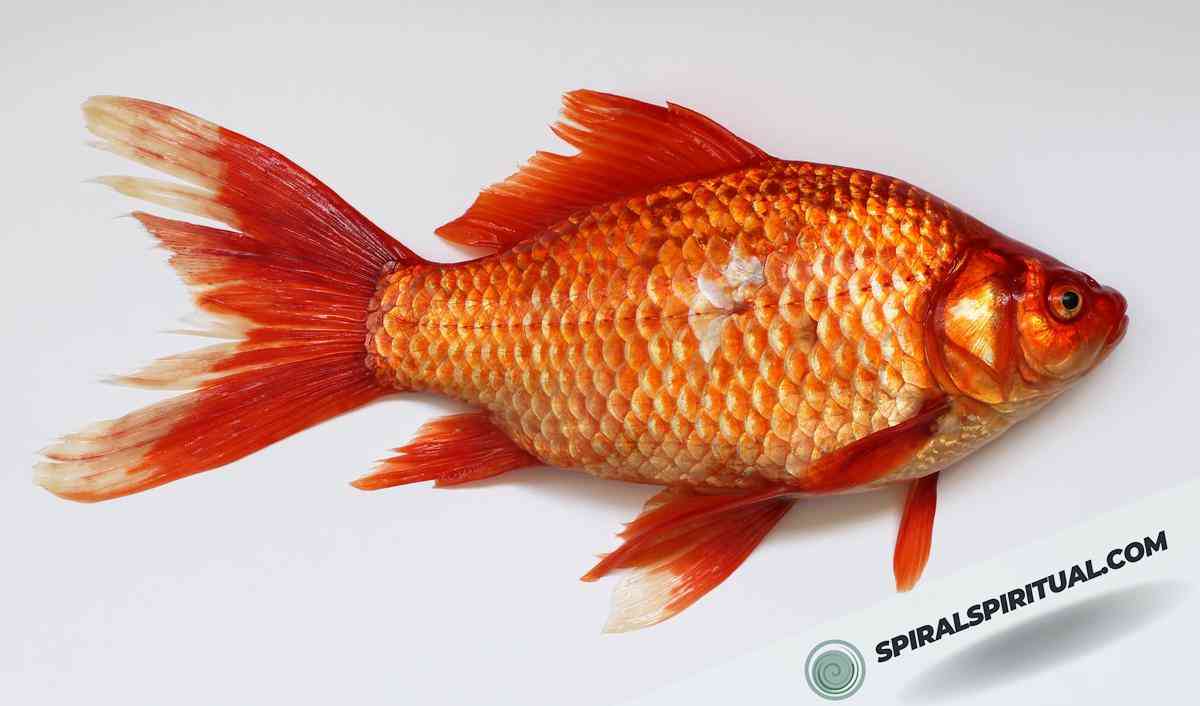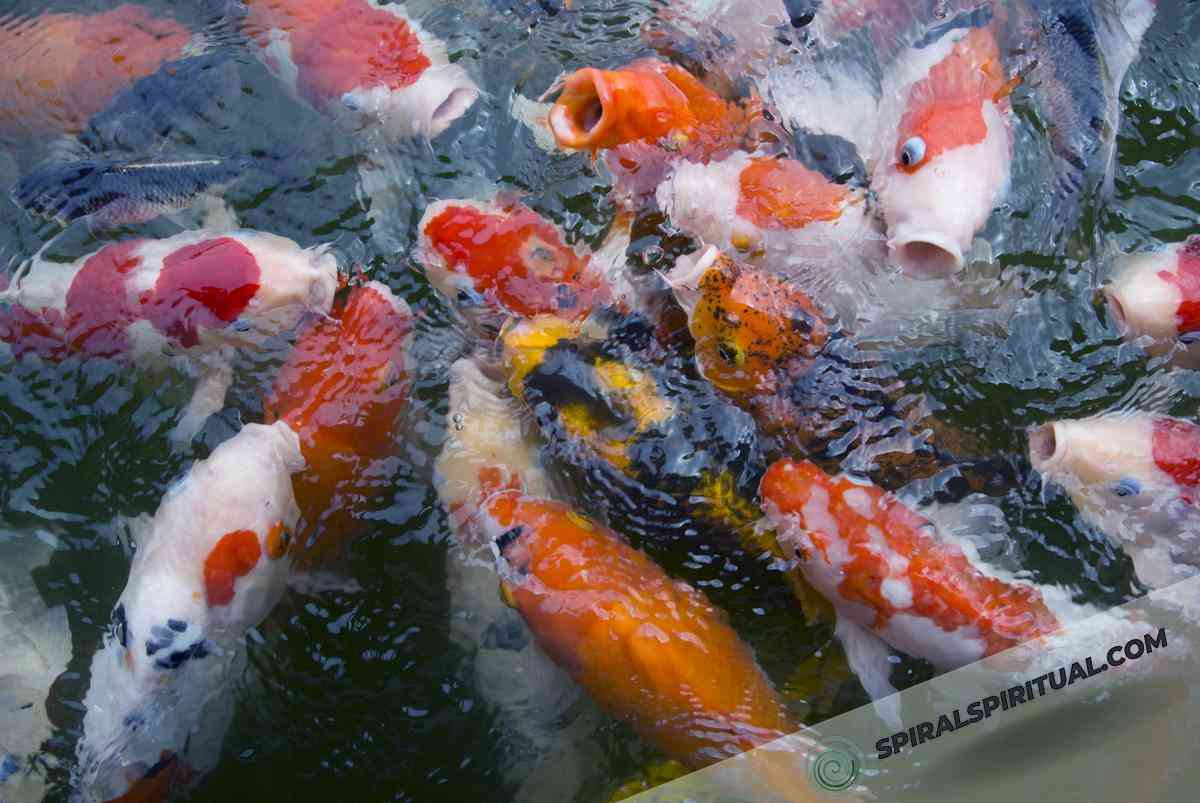What Do Carp Symbolize Spiritually?
Some spiritual beliefs see carp as representing resolve, change, and not giving up. Carp are admired for swimming against strong currents. This shows the value of staying determined when dealing with barriers. They are seen as a symbol of personal growth, as they transform from a small fish into a powerful and majestic creature through hardship and perseverance.
5 Spiritual Meanings Behind the Carp
One day, my friend Samantha saw a striking carp in a peaceful garden pond. She couldn’t look away from its graceful moves and strength. She saw a bit of her own story in the fish. When Samantha hit plenty of troubles and knockbacks over time, she kept thinking back to what the carp stands for – determination and change. Its tireless spirit pushed Samantha to hang in there when life got hard. It reminded her that with patience and grit, she could conquer any barrier.
The carp holds many spiritual meanings across traditions, this are the 5 most common spiritual meaning that he represents:
- Transformation and Resilience: The carp’s power to change from a little fish into a grand one shows personal growth and metamorphosis. Its resilience fighting tough currents represents the value of inner fortitude when facing life’s hurdles.
- Determination and Perseverance: The carp’s tireless resolve to swim upriver is a symbolic nudge to stay focused and firm despite barriers. It shows the worth of persisting and the gains that come from completely committing to our aims.
- Adaptability and Flexibility: Carp can live in different water habitats. This flexibility reminds us to be adaptable in life – getting used to new situations, welcoming change, and finding balance with life’s ups and downs.
- Wisdom and Longevity: Carp have traditionally been tied to wisdom and long life. In myths and some spiritual views, they are often honored as beings with great understanding. They can rise above worldly limits. Seeing them represents seeking knowledge, enlightenment, and spiritual growth.
- Symbol of Abundance and Prosperity: Carp can have many offspring. So they’re seen as representing plenty and success traditionally. Growing traits like generosity, thankfulness, and a positive outlook matches the spiritual power of the carp. This can help bring prosperity into different parts of our lives.
These spiritual meanings, attributed to the carp’s symbolism, are widely acknowledged in religious and philosophical teachings concerning the significance of animals and their archetypal representation.
The Symbolism of Carp in Different Cultures
The meaning of carp differs between cultures. This shows the distinct faiths and myths linked to this incredible fish, for example:
- In Chinese culture, the carp holds immense significance as a harbinger of good luck, prosperity, and abundance. Drawing from the tale of the Dragon Gate, where carp transform into powerful dragons upon overcoming obstacles, the Chinese view carp as symbols of ambition, transformation, and the attainment of goals.
- Japanese reverence for the carp, known as koi, centers on qualities of strength, perseverance, and courage. Inspired by the Chinese legend, Japanese folklore celebrates the koi’s ability to triumph over adversity and achieve success. Depicted in various forms of art, koi fish embody good fortune and the pursuit of one’s aspirations.
- Korean culture assigns the carp a significant role as a symbol of unwavering fidelity and perseverance. Inspired by the tale of the carp transcending into a dragon after traversing the mythical Dragon Gate, Koreans associate the fish’s tenacity with marital harmony, loyalty, and the pursuit of excellence.
- In Europe, the carp symbolizes themes of resurrection and spirituality, often intertwined with Christian iconography. The carp’s survival instincts parallel the resurrection of Christ, while also representing good fortune and abundance during festive winter holidays.
These views come from cultural stories, customs, and local lore. They showcase the wide symbolism of the carp. It’s key to see that meanings can also differ within cultures. This leaves space for personal takes and regional traditions.
Carp Color

Different cultures have given spiritual meaning to the color of carp over time. These views often link each color to parts of life, luck, and destiny. The importance of the colors changes between cultures, but common themes and meanings emerge. Knowing the symbolism of carp colors can provide some understanding of the ideals and faiths within various societies.
| Color | Symbolism |
|---|---|
| Red | Red is commonly associated with good luck, success, and vitality. It signifies power, passion, and energy. According to ancient beliefs, red carp symbolize strength and perseverance in overcoming obstacles. |
| Black | Black carp often represent mystery, wisdom, and transformation. They are associated with depth, hidden potential, and adaptability. Black symbolizes the ability to navigate through the unknown and emerge stronger. |
| Blue | Blue carp typically symbolize peace, calmness, and tranquility. They embody serenity, harmony, and emotional stability. Blue is often associated with spirituality and represents a connection to the divine. |
| Yellow | Yellow carp are commonly linked to wealth, prosperity, and abundance. They symbolize good fortune, happiness, and joy. Yellow is associated with sunshine and positive energy. |
| White | White carp often represent purity, innocence, and spirituality. They symbolize new beginnings, enlightenment, and spiritual growth. White is associated with goodness, light, and divine guidance. |
| Gold | Gold carp are frequently associated with prosperity, wealth, and success. They represent good fortune, abundance, and material well-being. Gold symbolizes richness, opulence, and auspiciousness. |
Is the Carp a Good Omen?
Many folks pick carp as pets because of faith in their hopeful symbolism and sign of good things coming. They see carp as carrying luck, prosperity, and wins in life’s different areas. By keeping them in ponds or tanks, people want to take in the great power and fortune tied to these grand animals. Taking care of carp is thought to draw nice fate and blessings into homes and lives. This makes them a famous pet for those who believe in these symbolic meanings.
If They’re Appearing in Your Dreams
Dreams with carp are frequently seen as important messages from the subconscious. According to dream experts, the symbolic meaning of carp depends on the rest of the dream. They often stand for luck, plenty, and change. Seeing a carp freely swimming in clear water might mean growth, success, and new paths. On the other hand, a carp trapped or having a hard time in dirty water could show blocks or knock backs.
The carp has the connotation of something precious, something that is hard to capture but immensely valuable if it is caught.
– Robert A. Johnson
These symbolic interpretations provide insights into one’s emotional and psychological state. It is important to consider the overall dream narrative and personal experiences when deciphering the specific meaning of carp in dreams.
If You See a Dead Carp

If you dream about a dead carp, it might point to the end of a phase, chances you missed, or feeling stuck. Dream experts say a dead carp can show losing good fortune, barriers to your aims, or needing reflection and change. It’s key to think about the feelings and situation in the dream to get what it truly means.
Stressing that dream symbols frequently mirror parts of the dreamer’s unconscious self, psychologist Carl Jung felt dead creatures like fish can nudge us to inspect and deal with inner turmoil or stuff we haven’t worked out.
A Final Word
Looking at what carp spiritually stand for takes us into the deep woven cloth of cultural faith, color links, and dreams. From bringing luck and success in different societies to conveying emotions through their colors, carp act as meaningful spiritual guides. If we come across them in old stories or in our deepest dreams, they push us towards growth, overcoming barriers, and freeing the hidden riches of our souls. Their importance goes across borders, calling up a universal grasp of the deep ties between nature, symbolism, and our own spiritual paths.
References
Here is the literature that was used for writing this article:
- “The Book of Symbols: Reflections on Archetypal Images” by Taschen, Arbinger Institute
- “The Complete Illustrated Encyclopedia of Magical Plants” by Fair Winds Press, Susan Gregg
- “Guide to the Symbols: A Meditation on What We Can Learn from Some of the World’s Most Fascinating Symbols” by Andrews McMeel Publishing, Brian Braggs


